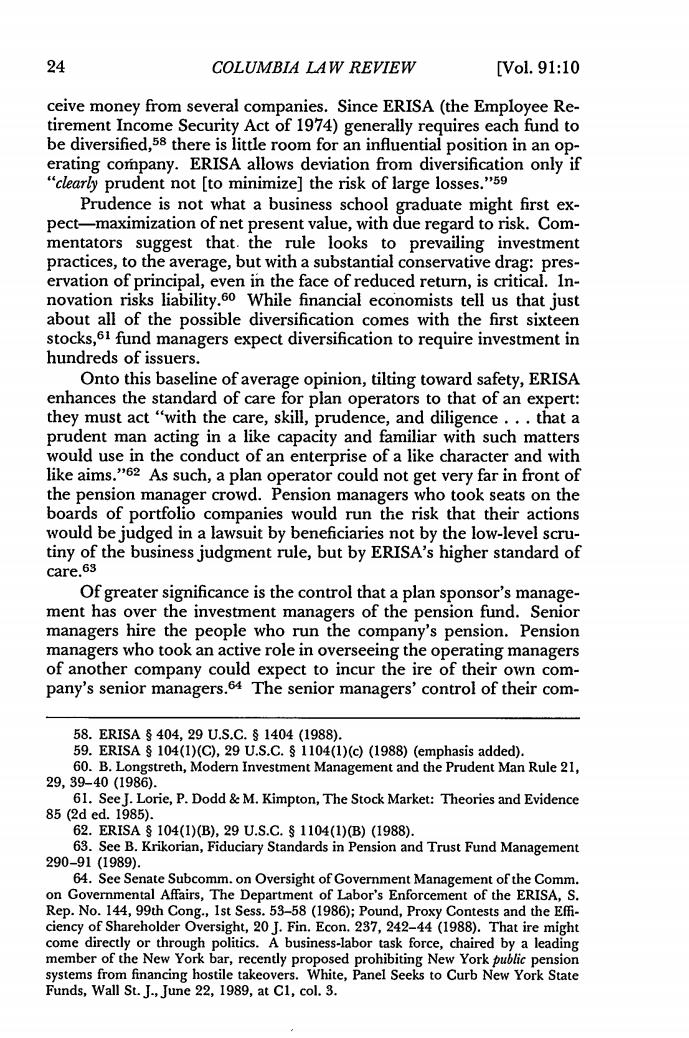正在加载图片...

24 COLUMBIA LAW REVIEW Vol.91:10 ceive money from several companies.Since ERISA(the Employee Re- tirement Income Security Act of 1974)generally requires each fund to be diversified,58 there is little room for an influential position in an op- erating company.ERISA allows deviation from diversification only if "rprudent not [to minimize]the risk of large losses. Prudence is not what a business school graduate might first ex- pect-maximization of net present value,with due regard to risk.Com- mentators suggest that.the rule looks to prevailing investment practices,to the average,but with a substantial conservative drag:pres- n in the face of reduced return novatio iability s tell us that just toud magpcom rquire invement hundreds of issuers Onto this baselin of average opinion,tilting toward safety,ERISA enhances the stan a of care r plan operators to that of an expert they must act "with the care,skill,prudence,and diligence.that a prudent man acting in a like capacity and familiar with such matters would use in the conduct of an enterprise of a like character and with like aims."62 As such,a plan op rator could not t get very y far in front of the pension ma ager crowd. sio managers v seats on the board of portfolio companies would run the risk that their actions would be judged in a lawsuit by beneficiaries not by the low-level scru- tiny of the business judgment rule,but by ERISA's higher standard of care,63 Of greater significance is the conrol that aplan sponsor nage ment has over the investment managers of the pension fund.Senior managers hire the people who run the company's pension.Pension managers who took an active role in overseeing the operating managers of another company could expect to incur the ire of their own com- pany's senior 64 Th senio manager. ntrol of th com 58.ERISA 40 29 U.S.C. 59.ERISA 81041 )d(1988 60.B.L0 ent Mana 29,39-40(1986 Lorie,P.Dodd M.Kimpton,The Stock Market:Theories and Evidence 104(1)(B)C(()(1 63.See B.Kriko nda nd Trust Fund mana agement 290-91(1989). 64.See Senate Subcomm.on Oversight of Government Management of the Comm airs,Th Depar58 (19 Dor s E forcement of the ER 20 1.F 6) ISA 237.242.441988.That the E come directly or through politics.A business-labor task force.chaired bya leadin ng hCOLUMBIA LAW REVIEW ceive money from several companies. Since ERISA (the Employee Retirement Income Security Act of 1974) generally requires each fund to be diversified, 58 there is little room for an influential position in an operating corhpany. ERISA allows deviation from diversification only if "clearly prudent not [to minimize] the risk of large losses." 5 9 Prudence is not what a business school graduate might first expect-maximization of net present value, with due regard to risk. Commentators suggest that. the rule looks to prevailing investment practices, to the average, but with a substantial conservative drag: preservation of principal, even in the face of reduced return, is critical. Innovation risks liability.60 While financial economists tell us that just about all of the possible diversification comes with the first sixteen stocks, 6 1 fund managers expect diversification to require investment in hundreds of issuers. Onto this baseline of average opinion, tilting toward safety, ERISA enhances the standard of care for plan operators to that of an expert: they must act "with the care, skill, prudence, and diligence., that a prudent man acting in a like capacity and familiar with such matters would use in the conduct of an enterprise of a like character and with like aims.' '6 2 As such, a plan operator could not get very far in front of the pension manager crowd. Pension managers who took seats on the boards of portfolio companies would run the risk that their actions would be judged in a lawsuit by beneficiaries not by the low-level scrutiny of the business judgment rule, but by ERISA's higher standard of care.63 Of greater significance is the control that a plan sponsor's management has over the investment managers of the pension fund. Senior managers hire the people who run the company's pension. Pension managers who took an active role in overseeing the operating managers of another company could expect to incur the ire of their own company's senior managers. 64 The senior managers' control of their com- 58. ERISA § 404, 29 U.S.C. § 1404 (1988). 59. ERISA § 104(1)(C), 29 U.S.C. § 1104(1)(c) (1988) (emphasis added). 60. B. Longstreth, Modem Investment Management and the Prudent Man Rule 21, 29, 39-40 (1986). 61. SeeJ. Lorie, P. Dodd & M. Kimpton, The Stock Market: Theories and Evidence 85 (2d ed. 1985). 62. ERISA § 104(1)(B), 29 U.S.C. § 1104(1)(B) (1988). 63. See B. Krikorian, Fiduciary Standards in Pension and Trust Fund Management 290-91 (1989). 64. See Senate Subcomm. on Oversight of Government Management of the Comm. on Governmental Affairs, The Department of Labor's Enforcement of the ERISA, S. Rep. No. 144, 99th Cong., 1st Sess. 53-58 (1986); Pound, Proxy Contests and the Efficiency of Shareholder Oversight, 20 J. Fin. Econ. 237, 242-44 (1988). That ire might come directly or through politics. A business-labor task force, chaired by a leading member of the New York bar, recently proposed prohibiting New York public pension systems from financing hostile takeovers. White, Panel Seeks to Curb New York State Funds, Wall St. J., June 22, 1989, at C1, col. 3. [Vol. 91:10